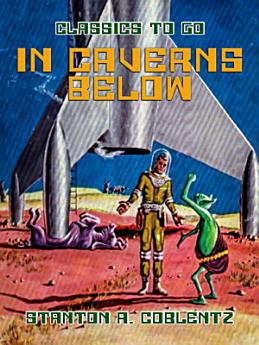In Caverns Below
Sep 2022 · Otbebookpublishing
E-Book
164
Seiten
family_home
Zulässig
info
reportBewertungen und Rezensionen werden nicht geprüft Weitere Informationen
Über dieses E-Book
Mining engineer Frank Comstock takes a job checking out the integrity of a shut-down mine in Nevada. He gets his answer when the mine caves in, plunging him far underground into a network of tunnels occupied by two warring races of unknown chalk-skinned humans! Frank finds himself in a world of trouble as he gets caught in a battle, captured by one side, taken under the protection of a curious professor, and integrated into this strange society. Frank finds Wu a bizarre place. Diplomats invent reasons to continue a pointless war, just to protect the jobs and dividends of arms producers. Prosperity is measured in the amount of excess production they need to destroy. Workers and owners regularly clash, and neither side comes out ahead. Plus, there are differences from the land he's left behind! (Goodreads)
Autoren-Profil
Stanton A. Coblentz (1896-1982) was an American poet, novelist, and essayist whose work traversed the realms of speculative fiction, satire, and social critique. Born in San Francisco, Coblentz's early life was marked by a voracious appetite for literature and a keen interest in the sciences, which later influenced his eclectic writing style.Coblentz's literary journey began with poetry, where he gained recognition for his lyrical and often whimsical verse. However, it was his foray into speculative fiction that cemented his place in literary history. He was a prolific contributor to the pulp magazines of the early 20th century, a breeding ground for many legendary science fiction and fantasy writers. His works often explored futuristic societies, technological advancements, and the potential consequences of human hubris, themes that resonate with contemporary audiences concerned with rapid technological change and ethical dilemmas.One of the most intriguing aspects of Coblentz's career was his ability to blend satire with speculative fiction. His sharp wit and critical eye were directed at societal norms, political systems, and cultural trends, making his work both entertaining and thought-provoking. This duality in his writing has drawn comparisons to later authors like Kurt Vonnegut and Philip K. Dick, who also used speculative fiction as a vehicle for social commentary.Coblentz was not without controversy. His critiques of industrialization and mechanization, while prescient, were sometimes viewed as overly pessimistic. Yet, it is this very skepticism that endears him to modern readers who grapple with the complexities of a rapidly evolving world.In addition to his literary contributions, Coblentz was a passionate advocate for the preservation of natural landscapes, a cause that aligned with his often dystopian views of unchecked technological progress. His legacy is one of a visionary thinker who dared to question the trajectory of human civilization, making him a timeless figure in the annals of speculative fiction.
Dieses E-Book bewerten
Deine Meinung ist gefragt!
Informationen zum Lesen
Smartphones und Tablets
Nachdem du die Google Play Bücher App für Android und iPad/iPhone installiert hast, wird diese automatisch mit deinem Konto synchronisiert, sodass du auch unterwegs online und offline lesen kannst.
Laptops und Computer
Im Webbrowser auf deinem Computer kannst du dir Hörbucher anhören, die du bei Google Play gekauft hast.
E-Reader und andere Geräte
Wenn du Bücher auf E-Ink-Geräten lesen möchtest, beispielsweise auf einem Kobo eReader, lade eine Datei herunter und übertrage sie auf dein Gerät. Eine ausführliche Anleitung zum Übertragen der Dateien auf unterstützte E-Reader findest du in der Hilfe.







